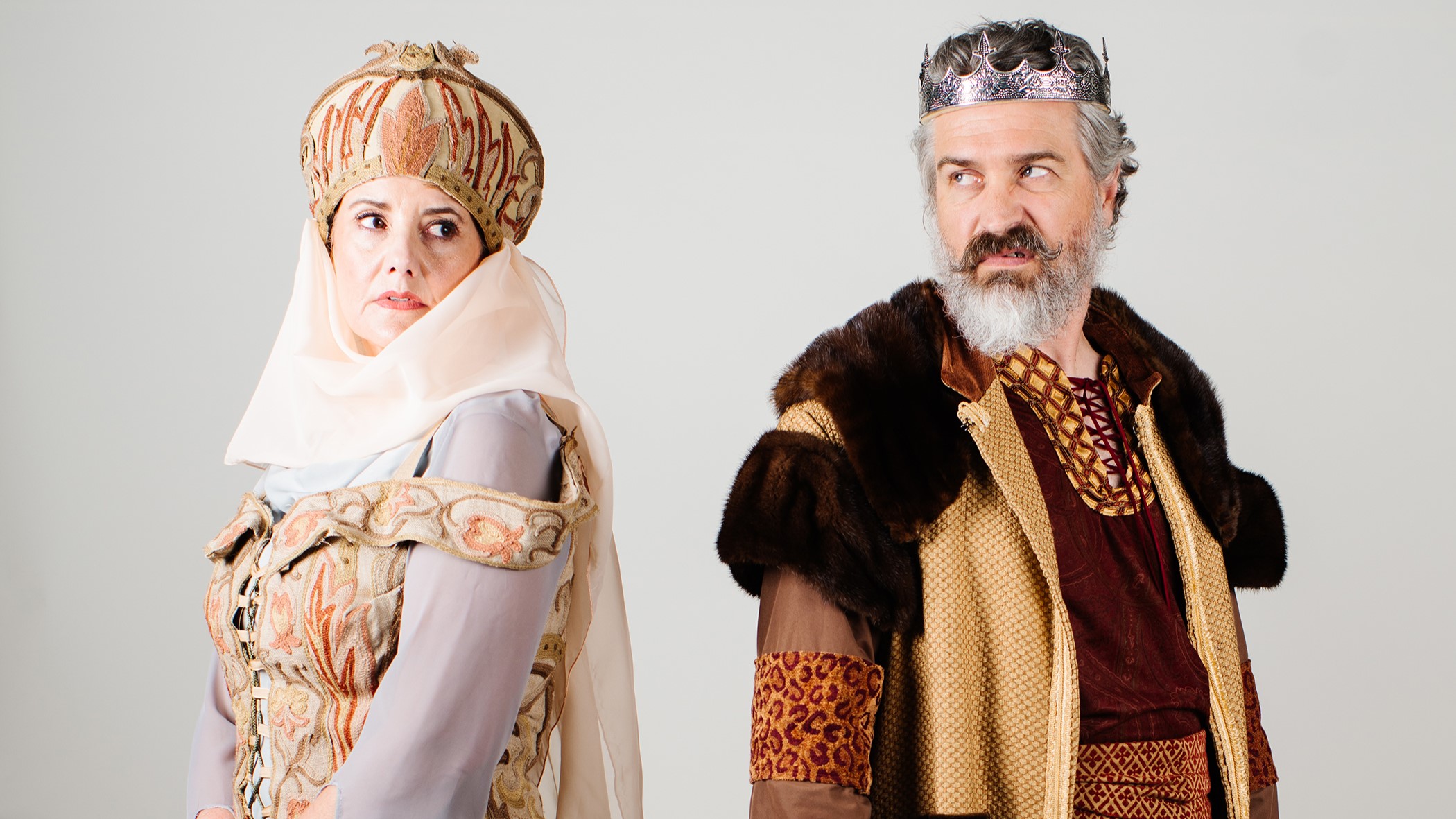CENTERVILLE — The Lion in Winter (written by James Goldman) is a straightforward script that never strays from its path; the characters clearly articulate their intentions and openly communicate what their feelings and true desires are. The play leaves no room for ambiguity and doesn’t create a mystery to solve; you’re never really left guessing on what might happen next, even though the intrigue and the drama of the family dynamics keep you wanting. And since there is no subplot, or characters having their own adventures off to the side, the play feels bare bones. But what the play lacks in substance, it makes up for in dialogue and characterization. The Lion in Winter is bursting with funny quips that are worth remembering, such as, “I could listen to you lie for hours,” or “I follow all your slaughters from a distance.” This banter between everyone has a tinge of Married with Children, where a dysfunctional family deliver barbs at each other at a lightning pace while still loving each other at the end of the story.

In the production of The Lion in Winter at CenterPoint Legacy Theatre, The stand out is Eleanor (played by Leslie Barrett) who wears a costume that brought forth vague recollections of Olenna Tyrell from Game of Thrones. Eleanor is the emotional center of the play, demonstrated by the fact that almost every time the lights black out at the end of a scene, it happens at the height of a revelation Eleanor has. For example, this occurs when she is trying to convince Richard that she loves him and will sign away her lands to him (but he doesn’t believe her). In another scene, Eleanor demands to watch King Henry (played by Nathan Riddle) kiss Alais (played by Isabella Giordano), and she begins to weep. Barrett has a cadence to her speech that makes her utterly delightful to listen to, and she helps add a special spice to all her sarcastic one liners. And although none of the actors don a British accent (for the best), Riddle has another lovely speaking voice that really draws me into the play.
It is difficult to pinpoint, but there is a touch of something that establishes the medieval European setting for The Lion in Winter that works throughout the entire play, and Jansen Davis‘s directing shines in this specific arena. An interesting choice Davis made is having Richard (played by Matthew Dickerson) regularly standing off to the side, away from the other characters, making him mysteriously aloof from the action. In many scenes, he even delivers his lines while staring off into the distance, looking away from everyone. The script describes Richard as someone who enjoys killing and fighting, raising the possible reason for his physical and emotional distance.
But in this vein, the characters never stray from their initial characterization. John (played by Alex Beck) is hapless and naïve throughout the play, Geoffrey (played by Mark Andrus) continues to lament how little his parents care about him, and Eleanor who is two parts desperate and sarcastic. Beck, Andrus, and Barrett are convincing in these roles, though I do wish the script would allow the characters to grow.
The two main characters who seem to be less consistent are Alais and Philip (played by Ryan Kinville), the King of France, who both serve as vehicles for the rest of the cast. King Henry is in love with Alais, but he has a much deeper relationship with Eleanor, who seems to draw more emotions and reactions out of him. Philip enjoys plotting, and watching the family fight, but he ends up just being connective tissue for the relationship between the King and his three sons. There is only one scene in the entire play where Philip and Alais directly interact, and unfortunately it does not feel as weighty as all the other interactions between the characters.

The set (designed by Brian Hahn and Jansen Davis) is threadbare, with just enough to establish a sense of time and place. The bottom level of the set has a long table with holly placed atop it, and on the upper level there are three settings: each have tapestries hanging from the wall, small tables and chairs and often times cups and wine to drink. This same level of simplicity is seen in the costuming by Sydnie Howard; the characters each have a distinct color scheme, Richard wears silver/black, King Henry wears red, John wears brown, Geoffrey wears green and Phillip wears purple. This makes it easy to keep track of who is who, and during the nighttime scenes, characters remove their belts so that their long shirts appear to be night gowns, which struck me as efficient.
The lighting (designed by Nathan Hadley) is functional, dominated by uncolored lighting that illuminates actors as they move about the set. There are only a few moments where colored light makes an appearance. For example, after Henry has cursed his sons, he collapses on the stairs in sorrow and the lights are blue. We get the same blue lights when Alais is talking to Phillip in her room. When the brothers are locked in the basement, the lights are blue to indicate darkness, but when the King and Alais bring candles, the lights slowly shift into a warm red to indicate light. The sparse use of colored lighting is purposeful and contributes to the scenes when used.
The CenterPoint Legacy Theatre production of The Lion in Winter is certainly a fun play to watch; there are many surprising, touching and funny moments between all the characters, thanks to the fantastic and effective directing. This is the ideal production for people who want a no-frills tale of familial dysfunction peppered with dramatic twists and turns.
[box]The CenterPoint Legacy Theatre production of The Lion in Winter plays Thursdays through Saturdays and Mondays at 7 PM in the Leishman Performance Hall at CenterPoint Legacy Theatre (525 North 400 West, Centerville). Tickets are $16. For more information, visit centerpointtheatre.org.[/box]
